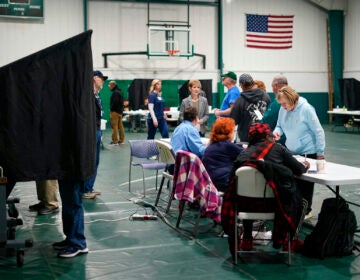Ex-offenders get out the vote for Philly DA race
Listen
Josenia Allen knocks on doors on South Street trying to get the vote out and distributing literature about the American Civil Liberties Union's Campaign for Smart Justice. (Emma Lee/WHYY)
“One more day.”
Just hours before the polls opened Tuesday, Nick Pressley gave out his marching orders to a group of canvassers wearing blue T-shirts. The group was gathered on the 15th floor of a Center City office building, just one block from the Philadelphia district attorney’s office.
Pressley is a campaign manger for the American Civil Liberties Union. As a nonprofit, the ACLU can’t endorse any of the eight candidates — seven Democrats and one Republican — running in Tuesday’s primary to replace District Attorney Seth Williams. Williams is not seeking a third term as he faces public corruption charges.
Instead, the ACLU was pushing a set of “smart justice values” — transparency and ending capital punishment, cash bail, racial profiling and civil-asset forfeiture.
“Philadelphia gets $5 million every year from civil-asset forfeiture — that’s hundreds of homes, cars, boats, money, cash,” Pressley said to vigorous nods from the group. “One million of that every year comes from people who are ultimately not convicted of a crime. All you have to do is be charged for them to take your stuff. We’ve got canvassers in here who’ve had to deal with that personally.”
Pressley said the goal was to reach 11,000 ACLU members in Philadelphia and to get them to understand why the DA race matters, so they don’t skip the polls in an off year.
That’s why the organization decided to hire former offenders to go door-to-door and pay them $15 an hour.
“Someone’s personal story about their experience of the criminal justice system can help really change hearts and minds and explain to folks just how important it is to people who may not have experienced that kind of stuff before,” Pressley said.
Canvasser Ben Slater, who had brushes with the law as a teenager, said he’s managed to convince several apathetic voters to take interest in the race.
“It’s not someone in Washington,” he said. “It’s someone a few blocks away that’s working, that’s deciding what’s going to happen to your kids … how charges get filed. And I think a lot of people are learning that from me talking to them.”
But some of those hitting the streets said they feel a significant disconnect between themselves and the people whose doors they’re knocking on.
“They understand when I say ‘ending civil-asset forfeiture’, but when I say ‘ending cash bail,’ their heads pop back,” said Vincent Andracki.
Andracki, who once sat in jail for two months because he couldn’t pay the $100 to bail himself out, admitted attacking a man who appeared to be stealing from his truck. But he said he feels many of the people he’s met as a canvasser don’t understand what it’s like to be accused, but not convicted of a crime, and to be unable to afford bail.
“We are brought up to believe that if you do wrong, then you pay for that, so it’s understandable,” he said. “But I just hope through my story that they understand that there’s programs, there’s other stuff that can be done instead of keeping somebody locked up.”
For Josenia Allen, the problem is the racial tension she feels in certain neighborhoods.
As she knocked on doors in South Philadelphia, Allen, who is black, said during one outing, an older white woman refused to take a flier from her.
“It was the way she looked at it, she had it in her hand like it was contaminated …,” Allen said. “But nevertheless, it didn’t stop me from canvassing.”
Allen said she’s spent a combined 28 years of her life incarcerated. Her brother is serving a life sentence for murder.
“It’s definitely personal,” she said. “It would have to be for me to be walking all over Philadelphia. I don’t care what they pay me, I don’t like to walk anywhere. But for this cause, I get up in the morning when it’s time to go to work, and I’m like, ‘Yeah. Let’s get these houses knocked on.'”
Allen said regardless of whether she motivates anyone else to vote, she feels empowered.
The polls are open Tuesday from 7 a.m. to 8 p.m.
WHYY is your source for fact-based, in-depth journalism and information. As a nonprofit organization, we rely on financial support from readers like you. Please give today.




